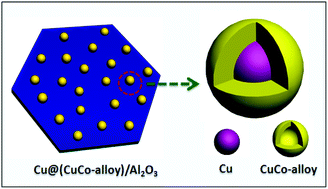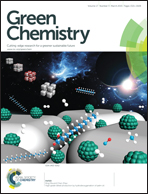Core–shell Cu@(CuCo-alloy)/Al2O3 catalysts for the synthesis of higher alcohols from syngas†
Abstract
The production of higher alcohols by the catalytic conversion of synthesis gas (CO + H2) is one of the most promising approaches for the utilization of nonoil resources, in which bimetallic catalysts based on Cu and Fischer–Tropsch (FT) reaction active elements (e.g. Co, Fe, Ni) are efficient and cost-effective candidates. Herein, we demonstrate the fabrication of core–shell Cu@(CuCo-alloy) nanoparticles (NPs) embedded on a Al2O3 matrix via an in situ growth of CuCoAl-LDH nanoplatelets on aluminum substrates followed by a calcination–reduction process, and they serve as efficient catalysts toward CO hydrogenation to produce higher alcohols. The composition, particle size and shell thickness can be tuned by changing the Cu/Co molar ratio in the LDH precursors, and the best catalytic behavior was obtained over the Cu/Co (1/2) catalyst with a CO conversion of 21.5% and a selectivity (C6+ slate 1-alcohols) of 48.9%, which is superior to the traditional modified FT catalysts. XPS, in situ FTIR spectroscopy and HAADF-STEM revealed that the unique electronic and geometric interaction between Cu and Co in the Cu@(CuCo-alloy) NPs contributes to the significantly enhanced catalytic performances. In addition, the 3D hierarchical structure of the Cu@(CuCo-alloy)/Al2O3 catalyst facilitates mass diffusion/transportation as well as prevents hotspot formation, accounting for its stability and recyclability. The Cu@(CuCo-alloy)/Al2O3 catalyst with significantly improved catalytic behavior can be potentially used in CO hydrogenation to produce higher alcohols.


 Please wait while we load your content...
Please wait while we load your content...